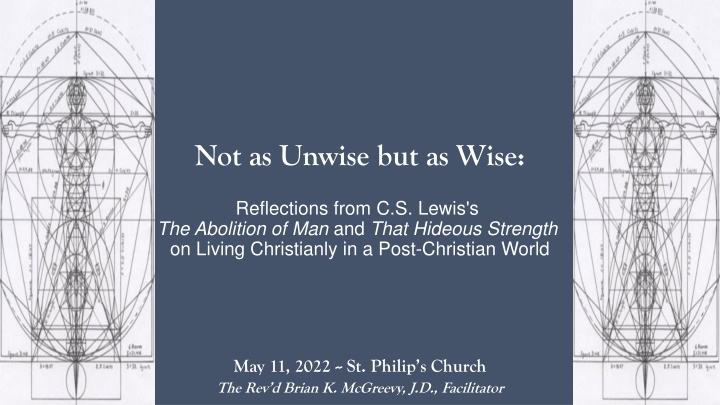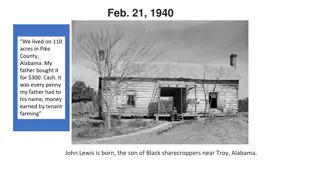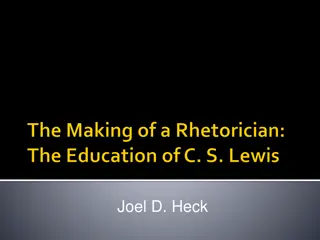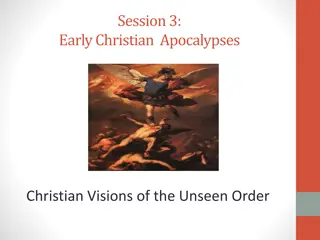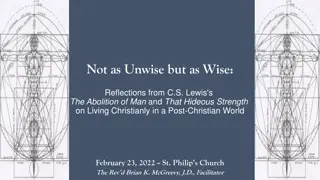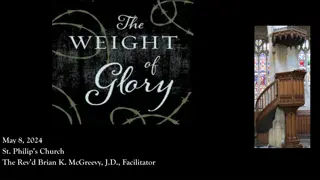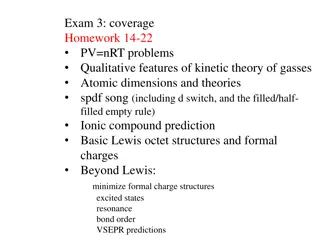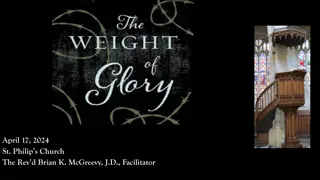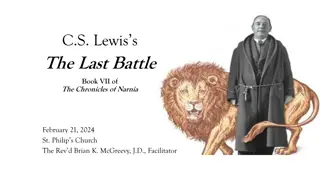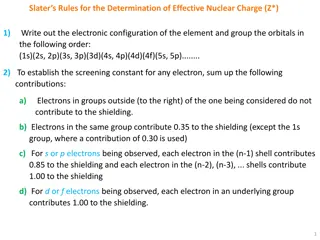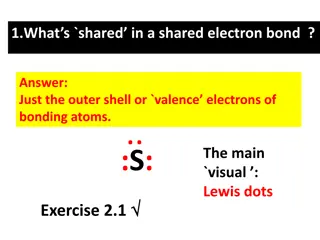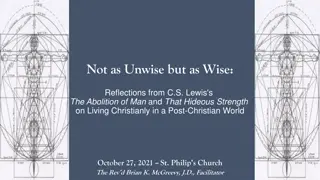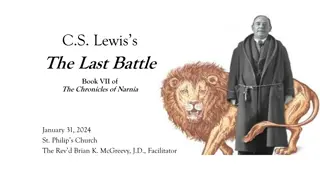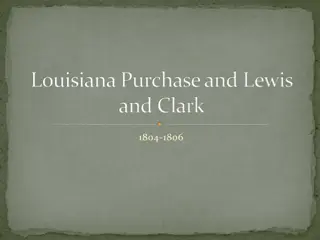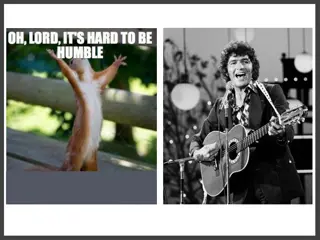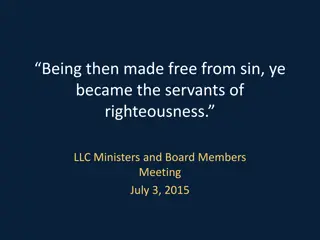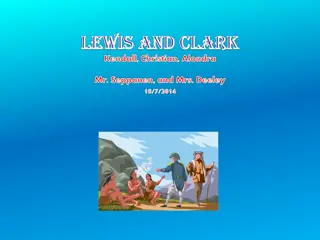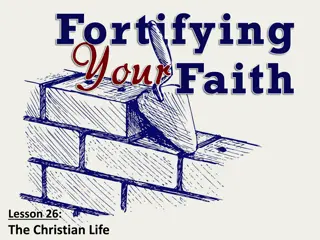Living Christianly in a Post-Christian World: Reflections on C.S. Lewis's Works
Reflections on living out Christian values in a post-Christian world through the teachings found in C.S. Lewis's "The Abolition of Man" and "That Hideous Strength." Explore themes of light versus darkness, wisdom, and the importance of discerning the will of the Lord. Dive into the Ransom Trilogy and uncover deeper meanings behind the tales of spiritual combat and redemption, providing insights for modern Christian living.
Download Presentation

Please find below an Image/Link to download the presentation.
The content on the website is provided AS IS for your information and personal use only. It may not be sold, licensed, or shared on other websites without obtaining consent from the author.If you encounter any issues during the download, it is possible that the publisher has removed the file from their server.
You are allowed to download the files provided on this website for personal or commercial use, subject to the condition that they are used lawfully. All files are the property of their respective owners.
The content on the website is provided AS IS for your information and personal use only. It may not be sold, licensed, or shared on other websites without obtaining consent from the author.
E N D
Presentation Transcript
Not as Unwise but as Wise: Reflections from C.S. Lewis's The Abolition of Man and That Hideous Strength on Living Christianly in a Post-Christian World May 11, 2022 -- St. Philip s Church The Rev d Brian K. McGreevy, J.D., Facilitator
For at one time you were darkness, but now you are light in the Lord. Walk as children of light (for the fruit of light is found in all that is good and right and true), and try to discern what is pleasing to the Lord. Take no part in the unfruitful works of darkness, but instead expose them. For it is shameful even to speak of the things that they do in secret. But when anything is exposed by the light, it becomes visible, for anything that becomes visible is light. Therefore it says, Awake, O sleeper, and arise from the dead, and Christ will shine on you. Look carefully then how you walk, not as unwise but as wise, making the best use of the time, because the days are evil. Therefore do not be foolish, but understand what the will of the Lord is. Ephesians 5: 8-17
How to approach this class: --On the beach --Snorkeling --Scuba diving --Email list How to read That Hideous Strength: --One chapter at a time --Make a chart of characters --Look for and note where themes from The Abolition of Man appear What we ll be doing each week: --Examining context and establishing a framework for appreciating these books --Unpacking the meaning of Lewis s works --Exploring their relevance for today --Considering how we can respond with practices of Hope and of Wisdom rooted in the Scriptures
REVIEW FROM PREVIOUS CLASSES Summary: Main theme of each chapter in The Abolition of Man 1. Men without Chests : The importance of objective values and the poison of subjectivism 2. The Way : Why the Tao, or Natural Law, is the sole source of all value judgments 3. The Abolition of Man : Man s control of Nature is in reality a means for some men (Conditioners) to control other men, using Nature as their instrument. To see through (deconstruct) all things is not to see at all. PLOT SUMMARY OF THE RANSOM TRILOGY Adapted from Taylor Dinerman, The Space Review -- Out of the Silent Planet, tells how Ransom, a Cambridge don on holiday, is kidnapped by the physicist Weston and his partner Devine, a sleazy businessman, and taken to Malacandra (Mars), supposedly as a human sacrifice. -- Perelandra, the name Lewis gives to Venus, is also the title of the second book in the series. Retelling the story of Adam and Eve, it is the most explicitly biblical of the three. Weston plays the role of the serpent sent to tempt the woman who is to become the mother of the world into rejecting God s will. Ransom is sent by the Oyarsa to challenge the evil one and to save Venus from the fate of Earth. -- That Hideous Strength combines a sordid tale of intra-university politics, Arthurian legend, and spiritual combat. In a small British University town, one of the colleges finds itself seduced and then engulfed by the newly established National Institute for Coordinated Experiments (N.I.C.E). This organization is secretly controlled by a pair of initiates, who plan to revive the wizard Merlin from his long, enchanted slumber and to use his powers for their own purposes. TITLE SOURCE The shadow of that hyddeous strength, sax myle and more it is of length (Sir David Lyndsay: from Ane Dialog, describing the Tower of Babel) This is a tall story about devilry, though it has behind it a serious point which I have tried to make in my Abolition of Man. from Preface to That Hideous Strength
REVIEW OF CHAPTER 1, SALE OF COLLEGE PROPERTY --Jane and her dreams --Mark and the Inner Circle at Bracton College --The proposal to sell Bragdon Wood and Merlin s Well to the N.I.C.E. --The Dimbles and rumors of Merlin REVIEW OF CHAPTER 2, DINNER WITH THE SUBWARDEN --Mark and being included in Feverstone s confidence in disdain of Curry and Busby --The N.I.C.E. as the ultimate Inner Circle/Ring , focused on taking over and reconditioning the human race, controlling and subduing Nature, and exerting control over the interplanetary wars --Jane s fears and vulnerability, which she later rejects as unworthy --Mark s journey to Belbury and Jane s journey to St. Anne s-on-the-Hill REVIEW OF CHAPTER 3, BELBURY AND ST. ANNE S-ON-THE-HILL --doublespeak at the N.I.C.E.: does Mark have a job or not? Bill Hingest leaving the N.I.C.E. --Jane s visit to St. Anne s and her denial and her aversion to being interfered with --Mark s introduction to Fairy Hardcastle and the role of the N.I.C.E. secret police --Jane s resentment of how much she has had to give up in marriage; Mother Dimble s crisis REVIEW OF CHAPTER 4, THE LIQUIDATION OF ANACHRONISMS --the N.I.C.E. begin turning people out of their homes and destroying Edgestow s beauty --Bill Hingest is murdered the night he leaves the N.I.C.E. --Mark has a strange conversation with the N.I.C.E. mad parson and is assigned a propaganda project on destroying the village of Cure Hardy, only to find he is moved by its beauty --the invasive force of workers from the N.I.C.E. results in partially destroying the beautiful Fellows Room at Bracton
REVIEW OF CHAPTER 5, ELASTICITY --Mark, frustrated by the doublespeak and lack of clarity at the N.I.C.E., attempts a showdown with Wither, the Deputy Director, that does not go well at all, and Mark fears he may not only lose his position at the N.I.C.E. but also his fellowship at Bracton College. --Fairy Hardcastle warns Mark about complaining and offers him project work writing propaganda to rehabilitate the image of Alcasan, the criminal murderer. It becomes clear that the N.I.C.E. intends to operate through threats and coercion. --Meanwhile, Jane spends time with Camilla and Arthur Denniston, learning that they now live at St. Anne's, a community run by Mr. Fisher-King, a renowned man incapacitated by a wounded heel. The Dennistons urge Jane to join their company and use her gift of visions to help them for the good of all, but she refuses, wishing to guard her independence. REVIEW OF CHAPTER 6, FOG --As fog envelops Edgestow and the N.I.C.E., Mark in desperation accepts a job at the N.I.C.E. working on propaganda. --Mark is admitted to the Inner Circle at the N.I.C.E., learning he can get whatever money he wants from the N.I.C.E. steward. He begins work on propaganda supporting the riots being instigated by the N.I.C.E., suppressing his initial shock and moral repugnance, to assist the N.I.C.E. in getting emergency powers to suppress liberties. --In the village, Jane sees the man with pince-nez glasses and a pointed beard whom she recognizes from her latest dream. When he gets into a N.I.C.E. car, she immediately decides to go to St. Anne's-on-the-Hill, feeling "a total rejection, or revulsion from, this man on all levels of her being at once. REVIEW OF CHAPTER 7, THE PENDRAGON --After fleeing the man in the pince nez from the N.I.C.E., Jane arrives at St. Anne s and is taken to see the Director. --Upon entering the Director s room, Jane s entire world was unmade, as she is swept away by the Beauty and Holiness and Kingliness of the Director and the house. --Trying to return home afterwards, Jane is caught up in a riot, arrested by the N.I.C.E. police, tortured by Fairy Hardcastle, and then escapes back to the Manor at St. Anne s.
REVIEW OF CHAPTER 8, MOONLIGHT AT BELBURY --Wither expresses his displeasure to Fairy Hardcastle about her arrest and torture of Jane Studdock and failure to prevent her escape. --Mark is in good spirits as everyone talks about how well the riots went and smugly enjoys that most don t know the articles written about it were his propaganda project. --Wither flatters Mark and encourages him to invite Jane out to join them, but Mark refuses, displeasing Wither. --Mark converses with Filostrato, who advocates getting rid of all organic life on earth and then tells Mark that the Head has survived death, and his brain lives on. He reveals the Head is Francois Alcasan, and then takes Mark to a lab-type room to meet the Head. REVIEW OF CHAPTER 9, THE SARACEN S HEAD --Jane is horrified to see the bodiless Head of the N.I.C.E. in her dream and to see her husband Mark bow down to it. --The Director assures Jane they will try to rescue Mark. --Mark resolves he must bring Jane to Belbury if he is to save his life. --Fairy Hardcastle seeks to get Mark to sign a form allowing for Jane s arrest, arguing that she might be sent to an Asylum for accusing the Fairy of burning her with cigarettes. --At St. Anne s, Jane learns the story of Ransom, the Director, and his interplanetary travels and dealings with the eldils, as well as his identity as the Pendragon of Logres. --The Director holds Council with those at St. Anne s, stating that that Jane's dreams reveal that the N.I.C.E. have discovered a way of making themselves immortal, but that the Company must wait on the eldils to reveal their plan before taking any action.
REVIEW OF CHAPTER 10, THE CONQUERED CITY --Wither and Fairy Hardcastle produce Mark s long-lost wallet, saying it was found at the scene of Bill Hingest s murder, and seek to use this information to control and manipulate Mark. --Mark has a showdown with Dr. Dimble about where Jane is, and Dimble makes clear that he considers Mark and the N.I.C.E. as evil and a danger to Jane. He offers Mark the chance to leave the N.I.C.E., but Mark dithers and ends up being arrested for murder. --Jane s latest vision indicates that Merlin has awakened and that the site is nearby, so after prayer Jane, Denniston, and Dr. Dimble are dispatched to search for him. REVIEW OF CHAPTER 11, BATTLE BEGUN --The company at St. Anne's begins to go into action, sending Jane and Dimble and Denniston in search of Merlin, but their quest for him proves to be unfruitful. --The powers at the N.I.C.E. debate about whether torturing Mark would be fruitful or would disrupt Jane's visions, and their fear of that disruption keeps Mark safe for the moment. --Mark, confined to his prison cell, faces hanging but gains clarity about the folly of his obsession with the Inner Ring. REVIEW OF CHAPTER 12, WET AND WINDY NIGHT --The N.I.C.E. and the company at St. Anne s continue to search for Merlin; the N.I.C.E. finds an old man near the site of the well and brings him to their headquarters. Meanwhile, the real Merlin arrives at St. Anne s on horseback and turns out to be a Christian and an ally. --Mark learns he is in prison at the N.I.C.E. and may be liquidated unless he goes deeper into the work of the N.I.C.E., which he learns is being directed by dark forces (demons) via Alcasan.
REVIEW OF CHAPTER 13, THEY HAVE PULLED DOWN DEEP HEAVEN ON THEIR HEADS --Merlin has difficulty understanding that Ransom is not a king who can compel obedience from everyone in England. --The N.I.C.E. fawn upon the man they believe to be Merlin, trying to figure out what language he speaks, not realizing he is only a tramp. --Ransom explains to Merlin that the eldila and oyeresu are now involved because the N.I.C.E. sought to export their evil to other planets, with the result that they have pulled down Deep Heaven upon their heads. SUMMARY OF CHAPTER 14, REAL LIFE IS MEETING --adapted from Rudy Rentzel [Martin Buber (1878-1965) was an influential existentialist philosopher and theologian, who emphasized an "I and You" personal relationship with God that would deeply affect all our other relationships by making them more personal. He summarized these views in his saying, "All real life is meeting," from which Lewis derived this chapter s title.] Mark remains in a cell at Belbury, visited at times by Frost, who seeks to remove all emotions from him (all humanity and the personal), and replace them with complete objectivity (the impersonal and inhuman). Though Mark inwardly resists, he outwardly plays along, thinking he may eventually gain his freedom this way. As part of this process, he had to endure exposure to art intended to offend him in an effort to numb his human emotions. Instead, this method reinforces his determination to choose the opposite - the objective and normal, all wrapped up in his wife, Jane. Frost leads Mark to a bedroom with a roaring blaze and an old man in the bed and tells him to monitor the man, who does not speak English. If the man says anything, Mark is to call the Deputy Director. However, soon after Frost leaves, the old man wakes and speaks to Mark in English. [ Meanwhile, Jane helps Mother Dimble prepare a bedroom for the reuniting of Ivy Maggs with her husband, who is being released from prison. Jane begins to wonder how her relationship with Mark will develop when he returns. When Jane sits alone, she sees an enticing woman in a flame colored robe, who reminds her somewhat of Mother Dimble.
She then notices a group of five fat dwarfs accompanying her who mock Jane. The woman holds a torch, but when she touches items, instead of burning them, it causes ivy, honeysuckle, red roses, and lilies to grow. Meanwhile, the dwarfs tear up the room. Suddenly, Jane realized she was dreaming - yet the room was empty but for the bed which had been pulled to pieces. She decides to see the Director at once. Mr. Bultitude (the bear) climbs a tree over the walls of St. Anne s and encounters two men from the N.I.C.E., who wonder if perhaps he is an escaped bear from Belbury. They are on a mission to secure a wolf for use in experiments at the N.I.C.E., but the owner has balked when he learns what they intend. They are worried their boss at Belbury might fire them for not returning with the wolf and decide it is better to return with a bear than empty-handed, regardless of whether the bear is actually the one from Belbury. They throw Mr. Bultitude a drugged sandwich to subdue him, tie him up, throw him in the van, and take him back to Belbury. Meanwhile, Mark spends more time talking with the tramp. Wither and Frost bring in several experts who attempt to speak to him in various foreign languages, but the tramp fails to respond, maintaining an expression of tranquil indifference. Back at St. Anne s, the Director explains to Jane that as long as Merlin remains with them, they are not exactly in the 20th Century: they have entered into a time overlap through which Jane s gifts as a seer not yet converted to the Christian faith will cause her to run into presences that are pre-Christian and untransformed. Jane begins to realize that the Director stands on the side of Mother Dimble and her traditional views about marriage and men and women. While she hoped for a world where all differences of sex were taken away, she begins to suspect that a deeper reality may exist where the differences run all the way up the ladder. The Director reinforces this view by saying, "What is above and beyond all things is so masculine that we are all feminine in relation to it." The Director ventures the Huge Woman was the earthly Venus in anticipation of Oyarsa of Perelandra (Venus), since Director plans to bring Merlin before the various Oyarsas of the various planets so they can empower him. Since the N.I.C.E. has been advertising for experts in archaic Western dialects, the Director plans to send Merlin to the N.I.C.E. to apply for the post. Meanwhile, the Company receives word that Mr. Maggs has been sent to Belbury for "remedial treatment."
As Jane contemplates what the Director has been saying, it seems nonsensical to her as a view of religion. But as she reflects further, she realizes the Director and others at St. Anne s never speak about religion but instead speak of God. Rather than steam rising upwards, they picture strong, skillful hands thrusting downwards to make someone into a truer version of what that God had designed them to be. Jane experiences a profound change and encounters the presence of a Person who demanded everything right. The "Me" she had centered on before vanished, and in its place she felt something new being molded, an experience that was the most important of her life thus far (circling back to the chapter title s idea of metting a God who is personal, not an abstract idea). SUMMARY OF CHAPTER 15, THE DESCENT OF THE GODS Framing this chapter in the medieval view of the beauty and majesty of the Cosmos, Lewis has the chief angels (Oyeresu) of each planet descend upon St. Anne s in this chapter. Though they specifically descend to the Blue Room where the Director (Ransom) and Merlin await them alone, their descent affects all others at the household. First comes Viritrilbia (Mercury/Hermes), accompanied by the doubling, splitting, and recombining of thoughts, which they only endured with some knowledge of poetry, followed by Perelandra (Venus/Aphrodite), accompanied by a summer breeze and Charity such as no one on Earth had ever experienced. Next came Malacandra (Mars/Ares), bringing a sense of the ordered rhythm of the universe, sharing in a processional pomp, and a readiness for action, followed by Lurga (Saturn), accompanied by incredible pressure, freezing cold, and sorrow. Finally, Glundandra (Jupiter/ Jove/Zeus) descends with an aura of Kingship, power, festivities, and music, which dispelled the sorrow of Lurga. These Oyeresu (often confused by men with the "gods") empower Merlin for his task. MacPhee drives Merlin to Belbury and drops him off. Merlin presents himself as responding to the N.I.C.E. s ad for someone familiar with obscure languages. Frost and Wither mistake Merlin for a priestly type wearing a rusty cassock and a wide brimmed black hat. Merlin speaks to the tramp in a strange language which the tramp seems to recognize and respond to (likely a language empowered by Viritrilbia, the master of languages). Thus, Merlin can control Frost and Wither, since they are eager to please the man they believe to be Merlin.
Merlin says the tramp demands a tour of Belbury led by Wither and demands robes appropriate to his station. Wither dresses him with robes as a Doctor of Philosophy and begins the tour. Mark remains with Frost, who demands that Mark trample a large crucifix on the floor and otherwise insult it. Frost hopes this will confirm Mark is with them. Though Mark does not believe in Christianity, the demand disturbs him, and after much consternation, he emphatically states he will not do so. The N.I.C.E. Director, Jules, shows up for a scheduled dinner party; he is actually a figurehead but doesn t realize it and thinks he is directing the N.I.C.E. Jules is affronted that Wither is not there, but he eventually appears with the tramp in his robes and Merlin (as his interpreter) in tow. Jules is unimpressed with their appearance. Mark tries to speak to Jules, but Withers and Frost interfere. Jules expresses his displeasure at how things are being run. Wither expresses his sympathies and introduces the tramp as Dr. Ambrosius. Jules doesn't like him and dislikes his interpreter (the real Merlin) even more.
KEY PASSAGES FROM CHAPTER 14 You think, then, said Mark, that there would be no sense in asking whether the general tendency of the universe might be in the direction we should call Bad? There could be no sense at all, said Frost. The judgment you are trying to make turns out on inspection to be simply an expression of emotion I am referring to the famous Romanes lecture. When the so-called struggle for existence is seen simply as an actuarial theorem, we have, in Waddington s words, a concept as unemotional as a definite integral and the emotion disappears. With it disappears that preposterous idea of an external standard of value which the emotion produced. And the actual tendency of events, said Mark, would still be self- justified and in that sense good when it was working for the extinction of all organic life, as it presently will? Of course, replied Frost, if you insist on formulating the problem in those terms. In reality the question is meaningless. It presupposes a means and end pattern of thought which descends from Aristotle, who in his turn was merely hypostatising elements in the experience of an iron-age agricultural community. Motives are not the causes of action but its by-products. abolition of Objective Value, abolition of Good and Evil And that, continued Frost, is why a systematic training in objectivity must be given to you. Its purpose is to eliminate from your mind one by one the things you have hitherto regarded as grounds for action. It is like killing a nerve. That whole system of instinctive preferences, whatever ethical, sthetic, or logical disguise they wear, is to be simply destroyed. objectivity that is the absence/nullifcation of objective value He led him across the room to a narrower little door with a pointed arch, in the far wall. Here he paused and said, Go in.. . The room, at first sight, was an anticlimax. It appeared to be an empty committee room with a long table, eight or nine chairs, some pictures, and (oddly enough) a large step-ladder in one corner. Here also there were no windows; it was lit by an electric light which produced, better than Mark had ever seen it produced before, the illusion of daylight of a cold, grey place out of doors. This, combined with the absence of a fireplace, made it seem chilly though the temperature was not in fact very low. A man of trained sensibility would have seen at once that the room was ill-proportioned, not
grotesquely so, but sufficiently to produce dislike. It was too high and too narrow. Mark felt the effect without analysing the cause and the effect grew on him as time passed. Sitting staring about him he next noticed the door and thought at first that he was the victim of some optical illusion. It took him quite a long time to prove to himself that he was not. The point of the arch was not in the centre: the whole thing was lopsided. Once again, the error was not gross. The thing was near enough to the true to deceive you for a moment and to go on teasing the mind even after the deception had been unmasked. Involuntarily one kept shifting the head to find positions from which it would look right after all. He turned round and sat with his back to it one mustn t let it become an obsession. impact of architecture not aligned with true objective value Then he noticed the spots on the ceiling. They were not mere specks of dirt or discolouration. They were deliberately painted on: little round black spots placed at irregular intervals on the pale mustard-coloured surface He determined that he would not fall into the trap of trying to count them. They would be hard to count, they were so irregularly placed. Or weren t they? Now that his eyes were growing used to them (and one couldn t help noticing that there were five in that little group to the right), their arrangement seemed to hover on the verge of regularity. They suggested some kind of pattern. Their peculiar ugliness consisted in the very fact that they kept on suggesting it and then frustrating the expectation this aroused. Suddenly he realised that this was another trap. He fixed his eyes on the table. There were spots on the table too: white ones. Shiny white spots, not quite round. And arranged, apparently, to correspond to the spots on the ceiling. Or were they? No, of course not ah, now he had it. The pattern (if you could call it a pattern) on the table was an exact reversal of that on the ceiling. But with certain exceptions. He found he was glancing rapidly from one to the other, trying to puzzle it out. For the third time he checked himself. He got up and began to walk about. He had a look at the pictures. Some of them belonged to a school of art with which he was already familiar. There was a portrait of a young woman who held her mouth wide open to reveal the fact that the inside of it was thickly overgrown with hair. It was very skilfully painted in the photographic manner so that you could almost feel that hair: indeed you could not avoid feeling it however hard you tried. he had not had such a sensation before. For the moment he hardly cared if Frost and Wither killed him. impact of art not aligned with true objective value (loss of hope)
There was a giant mantis playing a fiddle while being eaten by another mantis, and a man with corkscrews instead of arms bathing in a flat, sadly coloured sea beneath a summer sunset At first, most of them seemed rather ordinary, though Mark was a little surprised at the predominance of scriptural themes. It was only it the second or third glance that one discovered certain unaccountable details something odd about the positions of the figures feet or the arrangement of their fingers or the grouping. And who was the person standing between the Christ and the Lazarus? And why were there so many beetles under the table in the Last Supper? What was the curious trick of lighting that made each picture look like something seen in delirium? When once these questions had been raised the apparent ordinariness of the pictures became their supreme menace like the ominous surface innocence at the beginning of certain dreams. Every fold of drapery every piece of architecture, had a meaning one could not grasp but which withered the mind. Compared with these the other, surrealistic, pictures were mere foolery. art used for Evil to wither the mind Long ago Mark had read somewhere of things of that extreme Evil which seem innocent to the unintitiate, and had wondered what sort of things they might be. Now he felt he knew. He turned his back on the pictures and sat down. He understood the whole business now. Frost was not trying to make him insane: at least not in the sense Mark had hitherto given to the word insanity To sit in the room was the first step towards what Frost called objectivity the process whereby all specifically human reactions were killed in a man so that he might become fit for the fastidious society of the Macrobes. Higher degrees in the asceticism of anti-Nature would doubtless follow: the eating of abominable food, the dabbling in dirt and blood, the ritual performances of calculated obscenities. They were, in a sense, playing quite fair with him offering him the very same initiation through which they themselves had passed and which had divided them from humanity, distending and dissipating Wither into a shapeless ruin while it condensed and sharpened Frost into the hard, bright, little needle that he now was. But after an hour or so this long, high coffin of a room began to produce on Mark an effect which his instructor had probably not anticipated. There was no return of the attack which he had suffered last night in the cell. Whether because be had already survived that attack, or because the imminence of death had drawn the tooth of his lifelong desire for the esoteric, or because he had (in a fashion) called very urgently for help, the built and painted perversity of this room had the effect of making him aware, as he had never been aware before,
of this rooms opposite. As the desert first teaches men to love water, or as absence first reveals affection, there rose up against this background of the sour and the crooked some kind of vision of the sweet and the straight. Something else something he vaguely called the Normal apparently existed. He had never thought about it before. But there it was solid, massive, with a shape of its own, almost like something you could touch, or eat, or fall in love with. It was all mixed up with Jane and fried eggs and soap and sunlight and the rooks cawing at Cure Hardy and the thought that, somewhere outside, daylight was going on at that moment. He was not thinking in moral terms at all; or else (what is much the same thing) he was having his first deeply moral experience. He was choosing a side: the Normal. All that, as he called it, was what he chose. If the scientific point of view led away from all that, then be damned to the scientific point of view! The vehemence of his choice almost took his breath away; he had not had such a sensation before. For the moment he hardly cared if Frost and Wither killed him. importance of living in accord with God s created order for flourishing And day by day, as the process went on, that idea of the Straight or the Normal which had occurred to him during his first visit to this room, grew stronger and more solid in his mind till it had become a kind of mountain. He had never before known what an Idea meant: he had always thought till now that they were things inside one s own head. But now, when his head was continually attacked and often completely filled with the clinging corruption of the training, this Idea towered up above him something which obviously existed quite independently of himself and had hard rock surfaces which would not give, surfaces he could cling to. objective Truth of spiritual Reality You said she was a little like Mother Dimble. So she is. But Mother Dimble with something left out. Mother Dimble is friends with all that world as Merlinus is friends with the woods and rivers. But he isn t a wood or a river himself. She has not rejected it, but she has baptised it. She is a Christian wife. And you, you know, are not. Neither are you a virgin. You have put yourself where you must meet that Old Woman and you have rejected all that has happened to her since Maleldil came to Earth. So you get her raw not stronger than Mother Dimble would find her, but untransformed, demoniac. And you don t like it. identity without Christ s transforming influence
But your troublewe call it Pride. You are offended by the masculine itself: the loud irruptive, possessive thing the gold lion, the bearded bull which breaks through hedges and scatters the little kingdom of your primness as the dwarfs scattered the carefully made bed. The male you could have escaped, for it exists only on the biological level. But the masculine none of us can escape. What is above and beyond all things is so masculine that we are all feminine in relation to it. You had better agree with your adversary quickly. You mean I shall have to become a Christian? said Jane. It looks like it, said the Director. immutable reality of the creation, male and female It ought to have been she who was saying these things to the Christians. Hers ought to have been the vivid, perilous world brought against their grey formalised one; hers the quick, vital movements and theirs the stained glass attitudes. That was the antithesis she was used to. This time, in a sudden flash of purple and crimson, she remembered what stained glass was really like. failure to understand the Wonder of Christianity The Director laughed. The first step is easy. The enemies at Belbury are already looking for experts in archaic Western dialects, preferably Celtic. We shall send them an interpreter! Yes, by the splendour of Christ, we will send them one. Upon them He a spirit of frenzy sent. To call in haste for their destroyer. They have advertised in the papers for one! And after the first step well, you know, it will be easy. In fighting those who serve devils one always has this on one s side; their Masters hate them as much as they hate us. The moment we disable the human pawns enough to make them useless to Hell, their own Masters finish the work for us. They break their tools. waiting on the Lord and open doors Jane had gone into the garden to think. She accepted what the Director had said, yet it seemed to her nonsensical. His comparison between Mark s love and God s (since apparently there was a God) struck her nascent spirituality as indecent and irreverent. Religion ought to mean a realm in which her haunting female fear of being treated as a thing, an object of barter and desire and possession, would be set permanently at rest and what she called her true self would soar upwards and expand in some freer and purer world. For still she thought that Religion was a kind of exhalation or a cloud of incense, something steaming up from specially gifted souls towards a receptive Heaven. Then, quite sharply, it
occurred to her that the Director never talked about Religion: nor did the Dimbles nor Camilla. They talked about God. They had no picture in their minds of some mist steaming upward, rather of strong, skilful hands thrust down to make, and mend, perhaps even to destroy. Supposing one were a thing after all a thing designed and invented by Someone Else and valued for qualities quite different from what one had decided to regard as one s true self? Supposing all those people who, from the bachelor uncles down to Mark and Mother Dimble, had infuriatingly found her sweet and fresh when she wanted them to find her also interesting and important, had all along been simply right and perceived the sort of thing she was? Supposing Maleldil on this subject agreed with them and not with her? For one moment she had a ridiculous and scorching vision of a world in which God Himself would never understand, never take her with full seriousness. Then, at one particular corner of the gooseberry patch, the change came. What awaited her there was serious to the degree of sorrow and beyond. There was no form nor sound. The mould under the bushes, the moss on the path, and the little brick border, were not visibly changed. But they were changed. A boundary had been crossed. She had come into a world, or into a Person, or into the presence of a Person. Something expectant, patient, inexorable, met her with no veil or protection between. In the closeness of that contact she perceived at once that the Director s words had been entirely mis- leading. This demand which now pressed upon her was not, even by analogy, like any other demand. It was the origin of all right demands and contained them. In its light you could understand them: but from them you could know nothing of it. There was nothing, and never had been anything, like this. And now there was nothing except this. Yet also, everything had been like this; only by being like this had anything existed. In this height and depth and breadth the little idea of herself which she had hitherto called me dropped down and vanished, unfluttering, into bottomless distance, like a bird in a space without air. The name me was the name of a being whose existence she had never suspected, a being that did not yet fully exist but which was demanded. It was a person (not the person she had thought), yet also a thing, a made thing, made to please Another and in Him to please all others, a thing being made at this very moment, without its choice, in a shape it had never dreamed of. And the making went on amidst a kind of splendour or sorrow or both, whereof she could not tell whether it was in the moulding hands or in the kneaded lump. Words take too long. To be aware of all this and to know that it had already gone made one single experience. It was revealed only in its departure. The largest thing that had ever happened to her had, apparently, found room for itself in a moment of time too short to be called time at all
Her hand closed on nothing but a memory. And as it closed, without an instants pause, the voices of those who have not Joy rose howling and chattering from every corner of her being. Take care. Draw back. Keep your head. Don t commit yourself, they said. And then more subtly, from another quarter, You have had a religious experience. This is very interesting. Not everyone does. How much better you will now understand the Seventeenth-Century poets! Or from a third direction, more sweetly, Go on. Try to get it again. It will please the Director. But her defences had been captured and these counter-attacks were unsuccessful. power of conversion and subsequent transformation CHAPTER 15 At this reply the stranger started back, crossed himself several times, and exhibited every sign of terror. He turned and spoke rapidly in Latin to Frost and Wither. Something happened to their faces when he spoke. They looked like dog who have just picked up a scent. Then, with a loud exclamation the stranger caught up his skirts and made a bolt for the door. But the scientists were too quick for him. For a few minutes all three were wrangling there, Frost s teeth bared like an animal s, and the loose mask of Wither s face wearing, for once, a quite unambiguous expression But before he could make up his mind how to act, the stranger, shaking his head and holding out his hands, had come timidly back to the bedside. It was an odd thing that the tramp who had relaxed during the struggle at the door should suddenly stiffen again and fix his eyes on this frightened old man as if he were awaiting orders .More words in the unknown language followed. The tramp once more pointed at Wither and Frost. The stranger turned and spoke to them in Latin, apparently translating. Wither and Frost looked at one another as if each waited for his fellow to act. What followed was pure lunacy. With infinite caution, wheezing and creaking, down went the whole shaky senility of the Deputy Director, down onto its knees; and half a second later, with a jerky, metallic movement, Frost got down beside him. When he was down, he suddenly looked over his shoulder to where Mark was standing. The flash of pure hatred in his face, but hatred, as it were, crystallised so that it was no longer a passion and had no heat in it, was like touching metal in the Arctic where metal burns. Kneel, he bleated, and instantly turned his head. Mark never could remember afterwards whether he simply forgot to obey this order or whether his real rebellion dated from that moment. Hatred as concomitant of Evil
I am not satisfied. You do not seem to realise the dangers of the situation. We must take into account the possibility that the man is not Merlinus. And if he is not Merlinus, then the priest knows things he ought not to know. To allow an imposter and a spy to remain at large in the Institute is out of the question. We must find out at once where that priest gets his knowledge from. And where did you get the priest from? suspicion and distrust as concomitants of Evil Meanwhile, in the Objective Room, something like a crisis had developed between Mark and Professor Frost. As soon as they arrived there Mark saw that the table had been drawn back. On the floor lay a large crucifix, almost life size, a work of art in the Spanish tradition, ghastly and realistic. We have half an hour to pursue our exercises, said Frost looking at his watch. Then he instructed Mark to trample on it and insult it in other ways. Now whereas Jane had abandoned Christianity in early childhood, along with her belief in fairies and Santa Claus, Mark had never believed in it at all. At this moment, therefore, it crossed his mind for the very first time that there might conceivably be something in it. Frost who was watching him carefully knew perfectly well that this might be the result of the present experiment. He knew it for the very good reason that his own training by the Macrobes had, at one point, suggested the same odd idea to himself. But he had no choice. Whether he wished it or not this sort of thing was part of the initiation. But, look here, said Mark. What is it? said Frost. Pray be quick. We have only a limited time at our disposal. This, said Mark, pointing with an undefined reluctance to the horrible white figure on the cross. This is all surely a pure superstition. Well? Well, if so, what is there objective about stamping on the face? Isn t it just as subjective to spit on a thing like this as to worship it? I mean damn it all if it s only a bit of wood, why do anything about it? That is superficial. If you had been brought up in a non-Christian society, you would not be asked to do this. Of course, it is a superstition; but it is that particular superstition which has pressed upon our society for a great many centuries. It can be experimentally shown that it still forms a dominant system in the subconscious of many individuals whose conscious thought appears to wholly liberated. An explicit action in the reverse direction is therefore a necessary step towards complete objectivity. It is not a question for a priori discussion. We find it in practice that it cannot be dispensed with. Mark himself was surprised at the emotions he was undergoing. He did not regard the image with anything at all like a religious feeling. Most emphatically it did not belong to that idea of the Straight or Normal or Wholesome which had, for the last few days, been his support against
what he now knew of the innermost circle at Belbury. The horrible vigour of its realism was, indeed, in its own way as remote from that Idea as anything else in the room. That was one source of his reluctance. To insult even a carved image of such agony seemed an abominable act. But it was not the only source. With the introduction of this Christian symbol the whole situation had somehow altered. The thing was becoming incalculable. His simple antithesis of the Normal and the Diseased had obviously failed to take something into account. Why was the crucifix there? Why were more than half the poison-pictures religious? He had the sense of new parties to the conflict potential allies and enemies which he had not suspected before. If I take a step in any direction, he thought, I may step over a precipice. A donkey-like determination to plant hoofs and stay still at all costs arose in his mind. Pray make haste, said Frost. The quiet urgency of the voice, and the fact that he had so often obeyed it before, almost conquered him. He was on the verge of obeying, and getting the whole silly business over, when the defencelessness of the figure deterred him. The feeling was a very illogical one. Not because its hands were nailed and helpless, but because they were only made of wood and therefore even more helpless, because the thing, (or all its realism) was inanimate and could not in any way hit back, he paused. The unretaliating face of a doll one of Myrtle s dolls which he had pulled to pieces in boyhood had affected him in the same way and the memory, even now, was tender to the touch. What are you waiting for, Mr. Studdock? said Frost. Mark was well aware of the rising danger. Obviously, if he disobeyed, his last chance of getting out of Belbury alive might be gone. Even of getting out of this room. The smothering sensation once again attacked him. He was himself, he felt, as helpless as the wooden Christ. As he thought this, he found himself looking at the crucifix in a new way neither as a piece of wood nor a monument of superstition but as a bit of history. Christianity was nonsense, but one did not doubt that the man had lived and had been executed thus by the Belbury of those days. And that, as he suddenly saw, explained why this image, though not itself an image of the Straight or Normal, was yet in opposition to crooked Belbury. It was a picture of what happened when the Straight met the Crooked, a picture of the Crooked did to the Straight what it would do to him if he remained straight. It was, in a more emphatic sense than he had yet understood, a cross.
Mark made no reply. He was thinking, and thinking hard because he knew, that if he stopped even for a moment, mere terror of death would take the decision out of his hands Christianity was a fable. It would be ridiculous to die for a religion one did not believe. This Man himself, on that very cross, had discovered it to be a fable, and had died complaining that the God in whom he trusted had forsaken him had, in fact, found the universe a cheat. But this raised a question that Mark had never thought of before. Was that the moment at which to turn against the Man? If the universe was a cheat, was that a good reason for joining its side? Supposing the Straight was utterly powerless, always and everywhere certain to be mocked, tortured, and finally killed by the Crooked, what then? Why not go down with the ship? He began to be frightened by the very fact that his fears seemed to have momentarily vanished. They had been a safeguard they had prevented him, all his life, from making mad decisions like that which he was now making as he turned to Frost and said, It s all bloody nonsense, and I m damned if I do any such thing. Crooked v. Straight, Jesus s crucifixion as the ultimate collision between Good and Evil, Straight and Crooked It was indeed Wither who entered the room followed by a company whom Jules had not expected to see, and Wither s face had certainly good reason to look even more chaotic than usual. He had been bustled round his own Institute as if he were a kind of footman. He had not even been allowed to have supplies of blood and air turned on for the Head when they made him take them into the Head s room. And Merlin (if it was Merlin) had ignored it. Worst of all, it had gradually become clear to him that this intolerable incubus and his interpreter fully intended to be present at dinner. No one could be more keenly aware than Wither of the absurdity of introducing to Jules a shabby old priest who couldn t speak English, in charge of what looked like a somnambulist chimpanzee dressed up as a Doctor of Philosophy. To tell Jules the real explanation even if he knew which was the real explanation was out of the question. For Jules was a simple man to whom the word medieval meant only savage and in whom the word magic roused memories of The Golden Bough. It was a minor nuisance that ever since their visit to the Objective Room he had been compelled to have both Frost and Studdock in attendance. Nor did it mend matters that as they approached Jules and all eyes were fixed upon them, the pseudoMerlin collapsed into a chair, muttering, and closed his eyes. Evil and Lies entrap themselves
THEMES THAT APPEAR IN CHAPTERS 14 AND 15 --abolition of Objective Value, abolition of Good and Evil -- objectivity that is in fact the absence/nullification of Objective Value --negative impact of architecture not aligned with true Objective Value --negative impact of art not aligned with true Objective Value (loss of hope) --non-objective art used for Evil to wither the mind --importance of mimetic living--in accord with God s created order--for flourishing --objective Truth of spiritual Reality --flawed identity without Christ s transforming influence --immutable reality of the Creation, male and female --failure to understand the Wonder of Christianity --waiting on the Lord and open doors power of conversion and subsequent transformation Hatred as concomitant of Evil suspicion and distrust as concomitants of Evil --Crooked v. Straight, Jesus s crucifixion as the ultimate collision between Good and Evil, Straight and Crooked Evil and Lies entrap themselves
Practices of Hope and of Wisdom Finally, brothers, whatever is true, whatever is honorable, whatever is just, whatever is pure, whatever is lovely, whatever is commendable, if there is any excellence, if there is anything worthy of praise, think about these things.What you have learnedand received and heard and seen in me practice these things, and the God of peace will be with you. Phil. 4:8-9 1. Develop an appreciation for classical architecture that reflects Objective Value Let them construct a sanctuary for Me, that I may dwell among them. According to all that I am going to show you, as the pattern of the tabernacle and the pattern of all its furniture, just so you shall construct it. (Ex. 25:8-9) For he was looking for the city which has foundations, whose architect and builder is God (Heb. 11:10) [These] serve as a copy and shadow of the heavenly things, just as Moses was warned by God when he was about to erect the tabernacle; for, See, He says, that you make all things according to the pattern which was shown you on the mountain. (Heb. 8:5) 2. Develop an appreciation for art that reflects Objective Value And God saw everything that he had made, and behold, it was very good. And there was evening and there was morning, the sixth day. (Gen.1:31)The place where they serve is a sketch and shadow of the heavenly sanctuary, just as Moses was warned by God as he was about to complete the tabernacle. For he says, See that you make everything according to the design shown to you on the mountain. (Heb 8:5) 3. 3. Be discerning and wise about what is Evil and what is Good. For the time is coming when people will not endurensound1teaching, but having itching ears they will accumulate for themselves teachers to suit their own passions, 4 andowill turn away from listening to the truth andpwander off into myths. (2 Tim. 4:3-4) Woe to those who call evil good and good evil, who put darkness for light and light for darkness, who put bitter for sweet and sweet for bitter (Is. 5:20) 4. Meditate on the Cross and the new creation that results from Jesus s sacrifice for us. For the word of the cross is foolishness to those who are perishing, but to us who are being saved it is the power of God.(I Cor. 1:18)He is before all things, and in him all things hold together. And he is the head of the body, the church; he is the beginning and the firstborn from among the dead, so that in everything he might have the supremacy. For God was pleased to have all his fullness dwell in him, and through him to reconcile to himself all things, whether things on earth or things in heaven, by making peace through his blood, shed on the cross.(Col. 1:17-20)
